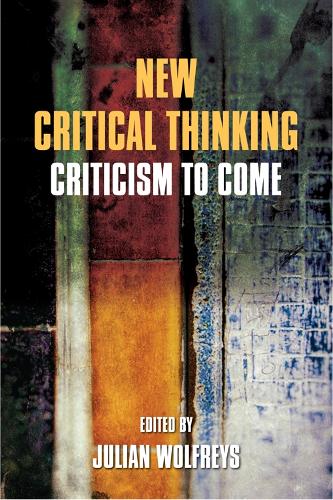
New Critical Thinking: Criticism to Come
(Hardback)
Available Formats
Publishing Details
New Critical Thinking: Criticism to Come
By (Author) Julian Wolfreys
Edinburgh University Press
Edinburgh University Press
5th October 2017
United Kingdom
Classifications
Adult Education
Non Fiction
801.95
Physical Properties
Hardback
224
Width 156mm, Height 234mm
278g
Description
Introduces advanced students of literature to the latest critical thinking
Following a scene-setting Introduction which reflects on the state of 'theory' today, the 11 chapters in this volume introduce new areas of critical thinking which go beyond the standard 'isms': Literary Reading in a Digital Age; Critical Making in the Digital Humanities; Thing Theory; Memory Work and Criticism; Body, Objects, Technology; Criticism and 'The Animal'; Multimodality and Linguistic Approaches to Literary Study; Critical and Creative Practice: Conditions for Success in the Writing Workshop; Affect Theory; Spectrality; Critical Climate Change.
A final rounding off chapter on Historicising presents debates around historically oriented criticism, including a 'round table' among the contributors. Each chapter also provides a critical 'case study' of a text or texts, including poetry writing guides, a Seamus Heaney poem, film adaptations of Jane Austen's Pride and Prejudice and Charlotte Bronte's Jane Eyre, e-readers and kindles, First World War poetry and prose, steampunk, and Robert Macfarlane's The Old Ways.
From 'Thing Theory' to animal theory, multimodality to film adaptation, and from acts of reading in a digital age to the creative writing workshop, the volume reflects a radical reorientation in critical modes of thinking.
Key Features:
Presents cutting-edge debates presented to more advanced students in an engaging yet sophisticated wayProvides a wide range of 'case studies' including poetry, film, reading devices, popular fiction & non-fiction proseReflects newly emerging ways of teaching critical ideas in the classroomOpens criticism to dialogue and possibility
Reviews
New Critical Thinking is positively alarming, a call to arms. In the remarkable range of its quite brilliant essays, it arms and disarms us at once, shocking us with the serious unpredictability of research, forging a critical attitude that is always an opening to what might come about: essaying as becoming, as possibility. Utterly outstanding. * Thomas Docherty, Professor of English and of Comparative Literature, University of Warwick *
Author Bio
Julian Wolfeys is Professor of English Literature at the University of Portsmouth, where he is also Director of the Centre for Studies in Literature. He is author and editor of more than 40 books on nineteenth- and twentieth-century English literature and literary theory. Most recently he has published Dickenss London and The Derrida Wordbook, both with Edinburgh University Press. He recently published his first novel, Silent Music.
